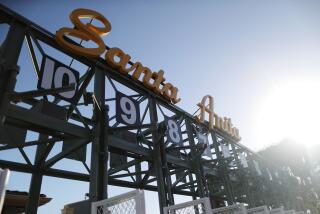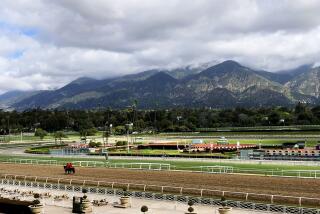Tab for $750 Cup Still Almost $2 Million Short : Since Victory, Sponsors Are Easier to Come By, Says Man in Charge of Debt
FREMANTLE, Australia — Melted down, the America’s Cup might be worth $750, but there are a few extra costs involved.
Let’s see, some research and development, three new boats, testing and training in Hawaii for a year, then campaigning on the other side of the world for five months and it all comes to about $15 million.
Dennis Conner and the Stars & Stripes crew will be bringing the Cup home today. By the way, it’s not quite paid for.
Charles Ward, Sail America’s marketing director and chief fund raiser, said the group is slightly less than $2 million away from covering expenses.
Only a few weeks after syndicate chairman Malin Burnham called a press conference to tell American reporters here that the effort was a little short--say, $4 million--the deficit has been cut in half.
“We’ve put together some deals with companies that had turned us down as recently as early January,” Ward said. “There’s never been a sporting event that’s had as much interest at the end as this. We promised it would become what it is, but a lot of them didn’t believe us.”
Ward, a confessed nonsailor from the University of Texas, was once a television newscaster for a station Lyndon Johnson owned in Austin. Last year, Burnham and Conner offered him a position and Ward found Conner to be “a man more committed to a goal than any political figure I had ever met.”
So Ward jumped in with both feet and, in July, sold his house in Houston and his advertising agencies in Houston, Austin and Dallas to join Stars & Stripes.
Since then he has been whittling away at the deficit, but what once was marble is now something more pliable. One factor was that some American companies waited to see which American effort would survive before backing any of them.
“The problem is that the racing is going to be over before some of the photo crews can get here from New York to do what they want to do with the new corporations we have involved,” Ward said before the final.
They didn’t make it, but no worries. As Conner sailed into the harbor after the last race, he flew one sponsor’s spinnaker, and the next day he went sailing just to fly a few more, as a photo helicopter circled the boat.
Ward hasn’t had any trouble adjusting to Australian time. He continued to live on Pacific time, often referring to a watch that flips to different time zones.
A typical day found him having dinner at 9 p.m. local time, but then leaving for his “war room” office near the Stars & Stripes compound, where he had what he called “target companies” taped to the walls. He would make phone calls back to the United States until about dawn, between catnaps on a cot.
“A guy’ll wake me up for $50,000 and I’ll ask for $100,000,” Ward said. “Then he’ll call back and say he’s changed his advertising budget around and he’ll go for $100,000.”
The next day, about the time the boat left to go racing, Ward would go to bed. He recalled the last race of the challenger finals against New Zealand when he closed a $250,000 deal with Pepsi.
“When Dennis went sailing that morning, the deal was not totally put together, but I ordered the podium and speakers, anyway,” Ward said.
“When Dennis won and everyone was drinking champagne, I hopped on board (Stars & Stripes) and told him about our new sponsor and that I’d like to visit with him in his office when we got back to go over his remarks.”
At the ceremony, Conner referred to the book, “The Other Guy Blinked,” written by Roger Enrico, Pepsi’s chief executive officer about the cola wars.
“We had a tough battle, too,” Conner said, “but the other guy blinked.”
There also have been a lot of donations from little people, down to a $5 check sent by a 4-year-old from Wisconsin to 40 cents offered by a tiny Australian visitor to the dock.
Conner tried to give it back, but the boy’s mother told Conner the lad would be terribly disappointed if he didn’t take it, so Conner loaded him up with bumper stickers and decals.
Ward feels sorry for the other syndicates that fell short on the water as well as at the bank.
“It’s hard enough for the winner to retire his debt,” Ward said. “For us to get millions of dollars when the event is over is a first in sports marketing.
“No one knew that this event would turn into a national cause, and the confusion with six American syndicates and the lack of a guarantee that your team would win made it a very difficult sponsorship program.”
Any major sponsor that comes in now must also commit for the next defense. On Friday, the day Stars & Stripes officially received the Cup, the syndicate announced that for 1990-91 it had received “the largest sponsorship in the history of the America’s Cup,” a commitment of more than $2 million from Merit cigarettes.
Ward said that aside from paying off the current shortfall, there is a “potential” of $5 million for the future, even though the site is only presumed to be San Diego.
“We haven’t promised anything,” Ward said.
More to Read
Go beyond the scoreboard
Get the latest on L.A.'s teams in the daily Sports Report newsletter.
You may occasionally receive promotional content from the Los Angeles Times.










